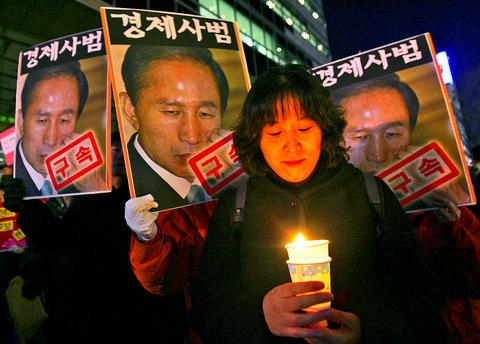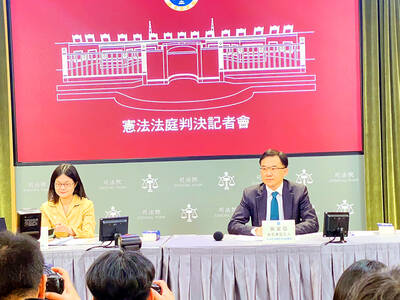South Korea's parliament voted yesterday to launch a new probe into fraud allegations against presidential opposition frontrunner Lee Myung-bak two days before the country goes to the polls.
A specially appointed independent lawyer will investigate claims including share-rigging, faking documents and embezzlement against Lee, the favorite in tomorrow's election, in the wake of new video evidence.
Analysts said Lee is still expected to win the presidency, but that the affair would cloud his first months in office.

PHOTO: AP
It was unclear when the new probe would start. If elected, he would assume office on Feb. 25 and as president would have immunity from prosecution.
The business-friendly Lee, 65, was cleared on Dec. 5 of a fraud allegedly engineered by his business partner and linked to the BBK investment firm.
However, government allies accused prosecutors of bias and pushed for an independent probe.
Some 160 lawmakers voted in favor of appointing the special counsel, with none against. Lee's conservative Grand National Party (GNP) did not participate.
"The motion on appointing an independent counsel has been passed," a parliamentary official said.
Pressure to reopen the probe was spurred on Sunday with the release of a video clip recorded in 2000 in which Lee appears to say during a speech at a university that he founded BBK.
He had previously denied involvement in the firm.
The video clip came to light after police arrested three men for trying to extort 2 billion won (US$3.2 million) from the GNP in return for withholding the tape.
Lee, a 65-year-old former construction executive, is seen by many as the candidate best suited to reinvigorate the economy after years of relatively modest growth.
When the deadline for opinion polls expired last week, he was almost 30 percentage points ahead of his closest rival.
The request for a special investigator was sent to the government yesterday for approval, and South Korean President Roh Moo-hyun is expected to endorse it, presidential spokesman Cheon Ho-seon said.
Roh told his justice minister on Sunday to consider reopening the prosecution probe, an action denounced by the GNP as interference in the election.
Roh is barred by the Constitution from standing for a second five-year term. Most of his political allies are members of the newly formed UNDP.
The justice ministry side-stepped Roh's call yesterday but said it would accept any inquiry by an independent counsel.
Lee said yesterday that he made "erroneous remarks" in the university speech while he was promoting a separate new business venture. But he again denied he had owned BBK.
Opponents went for the jugular.
"As of yesterday, GNP candidate Lee Myung-bak is nothing more than a criminal," UNDP candidate Chung Dong-Young said. "He must immediately stand down."
Analysts said the GNP candidate was still expected to win.
The video "will deal a painful but not lethal blow to Lee Myung-bak," said Chun In-young, a political science professor at Seoul National University.
Chun said Lee will still likely win but will be damaged while in office by the possibility of being questioned by an independent counsel, adding: "It may be hard for him to push for strong policies in office."

The US government has signed defense cooperation agreements with Japan and the Philippines to boost the deterrence capabilities of countries in the first island chain, a report by the National Security Bureau (NSB) showed. The main countries on the first island chain include the two nations and Taiwan. The bureau is to present the report at a meeting of the legislature’s Foreign Affairs and National Defense Committee tomorrow. The US military has deployed Typhon missile systems to Japan’s Yamaguchi Prefecture and Zambales province in the Philippines during their joint military exercises. It has also installed NMESIS anti-ship systems in Japan’s Okinawa

TRAGEDY STRIKES TAIPEI: The suspect died after falling off a building after he threw smoke grenades into Taipei Main Station and went on a killing spree in Zhongshan A 27-year-old suspect allegedly threw smoke grenades in Taipei Main Station and then proceeded to Zhongshan MRT Station in a random killing spree that resulted in the death of the suspect and two other civilians, and seven injured, including one in critical condition, as of press time last night. The suspect, identified as a man surnamed Chang Wen (張文), allegedly began the attack at Taipei Main Station, the Taipei Fire Department said, adding that it received a report at 5:24pm that smoke grenades had been thrown in the station. One man in his 50s was rushed to hospital after a cardiac arrest

ON ALERT: Taiwan’s partners would issue warnings if China attempted to use Interpol to target Taiwanese, and the global body has mechanisms to prevent it, an official said China has stationed two to four people specializing in Taiwan affairs at its embassies in several democratic countries to monitor and harass Taiwanese, actions that the host nations would not tolerate, National Security Bureau (NSB) Director-General Tsai Ming-yen (蔡明彥) said yesterday. Tsai made the comments at a meeting of the legislature’s Foreign Affairs and National Defense Committee, which asked him and Minister of National Defense Wellington Koo (顧立雄) to report on potential conflicts in the Taiwan Strait and military preparedness. Democratic Progressive Party (DPP) Legislator Michelle Lin (林楚茵) expressed concern that Beijing has posted personnel from China’s Taiwan Affairs Office to its

‘ILLEGAL RULING’: The KMT and the TPP slammed the Constitutional Court judgement, saying it contravened the law and was trying to clear the way for a ‘green dictatorship’ The Constitutional Court yesterday ruled that amendments to the Constitutional Court Procedure Act (憲法訴訟法) passed by the Legislative Yuan last year are unconstitutional, as they contravene due legislative process and separation of powers. The Legislative Yuan on Dec. 20 last year passed amendments stipulating that no fewer than 10 grand justices must take part in deliberations of the Constitutional Court, and at least nine grand justices must agree to declare a law unconstitutional. The Executive Yuan on Jan. 2 requested that lawmakers reconsider the bill, but the Legislative Yuan, under a combined majority of Chinese Nationalist Party (KMT) and Taiwan People’s Party